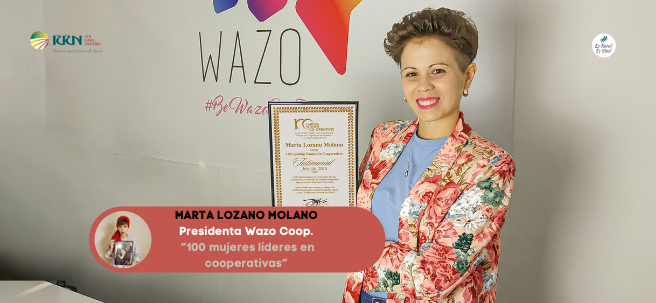
04 de November de 2020
Mujeres
04/11/2020. Marta Lozano Molano (Extremadura) is a composer. Her music has toured the world with orchestras such as the London Symphony Orchestra, the Royal Philharmonic Orchestra, and the Spanish Radio and Television Orchestra (ORTVE).
- RRN speaks with Marta Lozano Molano, recently named one of the 100 women leaders of cooperatives in the world.
 |
Her musical creativity is now channeled into the field of social and solidarity economy, serving as president of the Wazo Cop cooperative, a non-profit organization from which, together with her two partners, she works to generate a positive impact in rural areas.
It is this journey that has earned her recognition as one of the "100 Women Leaders in Cooperatives" internationally by the global organization advocating for women in cooperatives, She-Coops (Nigeria). This title recognizes excellence in leadership in initiatives with a positive impact on the environment in which they operate.
National Rural Network: Congratulations, Marta. When did this recognition come?
Marta Lozano : Thank you very much. It comes at a time when our cooperative is laying the legal foundations for a concept that until now did not exist and was not legally recognized in Extremadura: that of non-profit social cooperatives . Thus, our cooperative has transformed from a worker-owned cooperative into a social initiative cooperative with bylaws that were previously unheard of in the Extremadura region: recognizing a cooperative as a non-profit social entity.
RRN: What does Wazo Coop specifically do?
ML: To generate a positive impact in rural areas through social innovation. Thus, we develop projects to empower people and enable them to generate resources in their rural communities. Our projects are of two types: social and solidarity economy and heritage and cultural economy . There is a wealth of culture and heritage to be preserved in these villages.
RRN: How and why did you decide to found a cooperative?
ML: Our cooperative—made up of two members and myself—was founded in 2015 to provide solutions to the rural environment in which we live. Our goal was to prevent people from having to leave their homes to pursue their dreams. We understood, and this was our founding principle, that those of us who live in rural areas had to stop becoming victims and asking for help, and start offering solutions and alternatives. Ultimately, the cooperative spirit lies in stopping asking and starting to offer.
RRN: What projects are you developing at Wazo Coop?
ML: We currently have two specific projects underway. The “DESOPAEX Project,” which is for the sustainable development of Extremadura's heritage. It's a project aimed at 2030 and dedicated to highlighting the tangible and intangible heritage of rural areas in Extremadura, always within the framework of the social and solidarity economy. We're also implementing the “Raíces Project,” which is strictly aimed at preserving Extremadura's heritage. The manual “ Art in Ruins ” was developed for this project.
RRN: What role do cooperatives play in rural development today?
ML: Well, they play the role they want to play. If they want, they can be an engine of change. A cooperative may sound old-fashioned these days, but for us, the values of a cooperative are those of unity, solidarity, and equity, and these values should never go out of style. The limits of cooperatives are set by their members, and in that unity, strength is born. If it sets its mind to it, a cooperative can be a driving force for rural development. Our motto is that we must cooperativize change .
RRN: What challenges is the pandemic posing for you in the cooperative?
ML: It presents us with challenges such as the digitalization of work, which we understand as an opportunity for freedom and independence for rural areas that are physically isolated and that now have the opportunity to be connected to the rest of the world.
RRN: Have you noticed any changes in attitudes toward rural areas due to the pandemic?
ML: The pandemic is making the urban environment aware of something it already knew: rural areas have a higher quality of life. It's also serving to decentralize attention from what's happening in cities. Many things are also happening in towns and villages that deserve to be narrated and told to the rest of the world.









